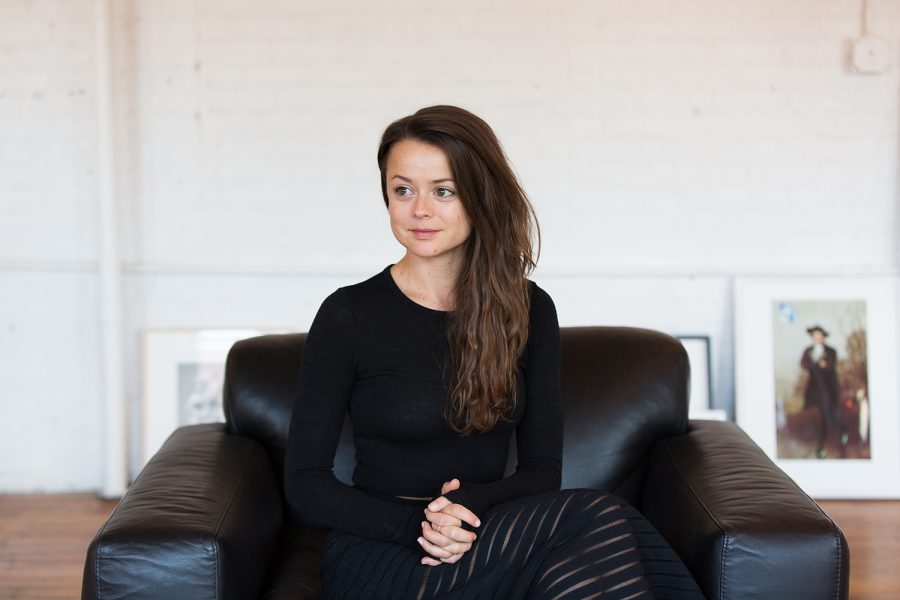Turning Roommate Horror Stories Into Fairy Tales
RoomZoom CEO Elien Becque. Room Zoom is a a matchmaking app for roommates.
February 7, 2018
Elien Becque commands the room when she enters. I spotted her as soon as she walked into the Think Coffee where we had agreed to meet, making her way to the back of the coffee shop with a steaming tea in her hand.
As the CEO and founder of RoomZoom, a matchmaking app for roommates, Becque is surely a busy woman but she’s not one to show it. She seemed relaxed and eager to talk as I set the interview into motion.
“We’re a digital roommate matching platform that I built based on an algorithm that basically takes all the logistic factors that are bearing on somebody’s move or somebody needing a roommate,” Becque said. We combine them to give every member a list of matches that match them according to their move date, their budget, how often they do the dishes, things like that.”
Becque was inspired to create RoomZoom after living in a four-bedroom apartment in Williamsburg, Brooklyn and watching roommates come and go.
“It was fairly often that somebody was moving out so it became this revolving door where, every six months or so, we’d be posting on Craigslist because we’d need a new roommate and that’s really where the very first part of the idea came from because it was so inefficient, that whole process,” Becque said.
“I don’t have one whopper of a story,” Becque said when I ask her about any personal horror stories. “It’s really the mental wear and tear every single day of your living space being either not quite how you want it or somehow imposing on your life that made me be like: ‘This doesn’t actually need to happen.’”
Becque graduated from Tufts University with a major in International Relations and a minor in English. When the opportunity for RoomZoom came along, she had to work with experts outside her field.
“I don’t code,” Becque said. ” I’ve never written a line of code. It probably would have been useful had I learned somewhere along the way but because I was studying liberal arts, I was pretty in love with that as a study and I have always outsourced all of our coding.”
Becque designed the algorithm using a spreadsheet software to compensate for her lack of technical ability, which ended up posing its own problem later on in development.
“We had several false starts with developers who told me ‘Yeah, this makes sense, I can do this’ but who actually weren’t understanding the real world implications in the way that you really need to in order to write the code correctly,” Becque said. “That was a huge challenge and incredibly frustrating in the time that I learned a lot in terms of finding a software team who also speaks human.”
“That’s what makes the job so fun,” Becque said with a newfound spark in her eyes; it’s clear that this is what empassions her. “It’s melding what’s happening in the real world with code with the sole purpose of making this real-world experience smoother. And I think that that’s what technology should do.”
“What’s the most important thing that somebody can find on RoomZoom that they could not find looking for apartments on their own,” I ask.
“RoomZoom is meant to be a very different and specific community of people who all need the same thing,” she said. “For instance, people use housing groups on Facebook which is not a terrible idea. These housing groups become specific forums sort of in the way RoomZoom is but the difference with RoomZoom is that it’s only people who have been approved according to a certain set of our criteria so it’s a much more intentional community of people.”
I might be the one interviewing Becque but she’s quick to ask me questions too, always trying to find out more about the roommate scene in universities. Before her time at RoomZoom, Becque was a journalist for Rolling Stone and Vanity Fair and her curiosity is still insatiable.
“We have such a diverse population [at NYU] that it would be amazing if we could have a better matching system,” I tell her.
“Well, in the real world, thankfully, it exists now,” Becque said. “If a university came to us and said ‘We’d really like to solve this problem for our students,’ we’d be able to hit the ground running.”
You heard her, NYU.
Correction Feb. 7: A previous version of this article included the incorrect name of the RoomZoom service. It was previously written ‘Room Zoom,’ but has since been corrected.
Email Laura Rubio at [email protected]
























































































































































